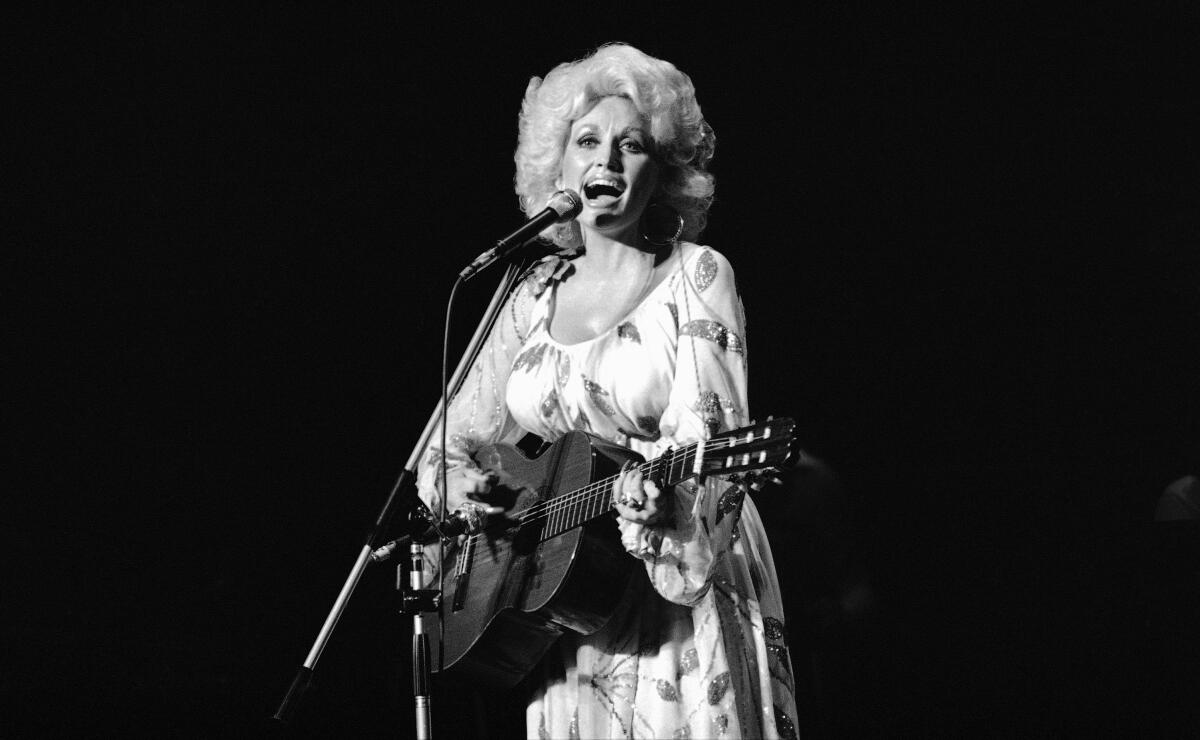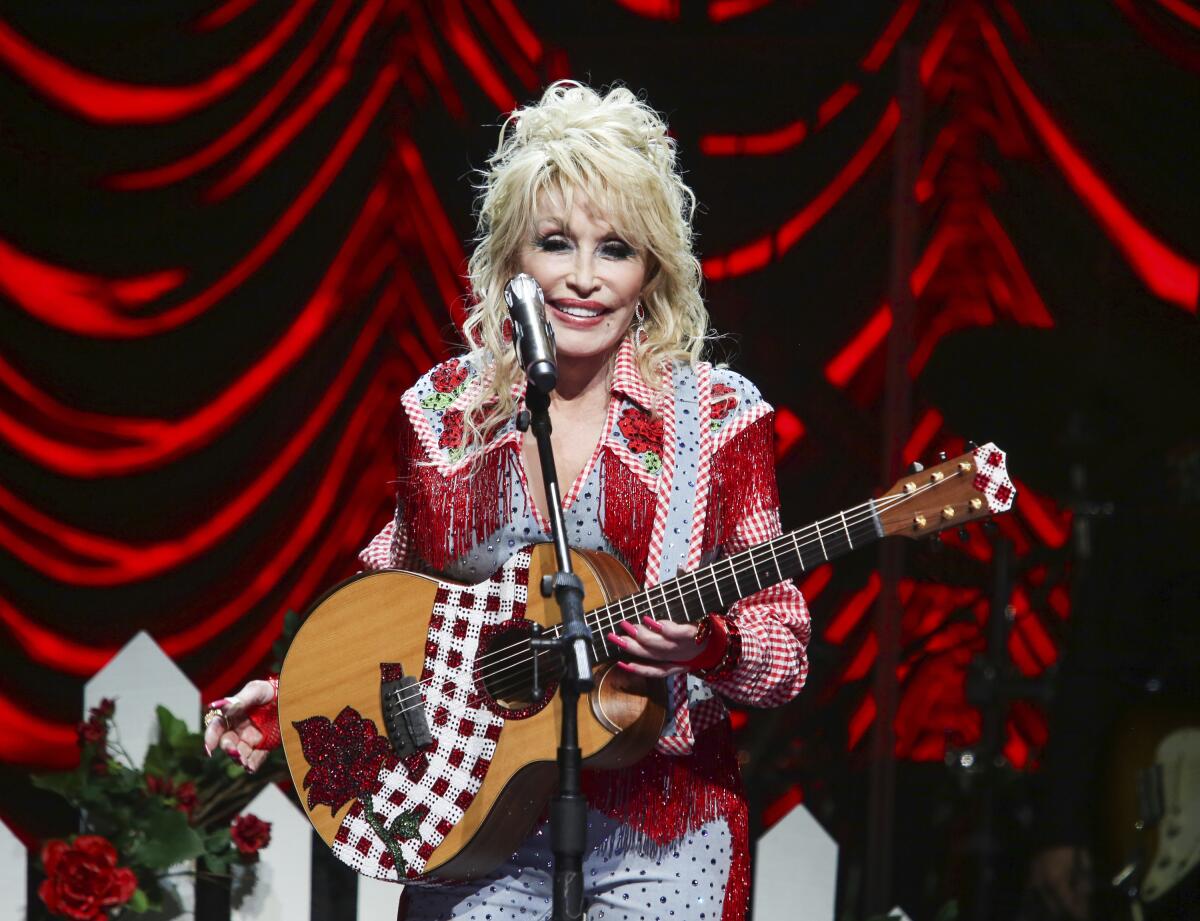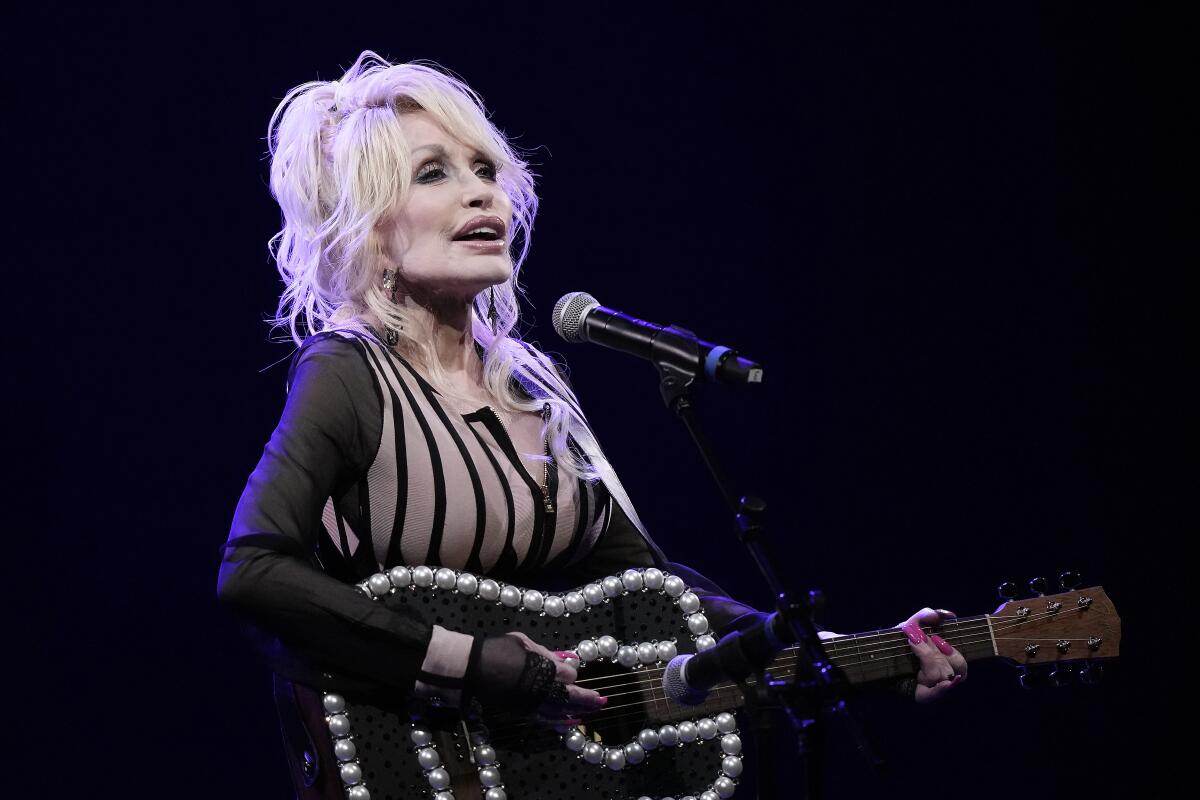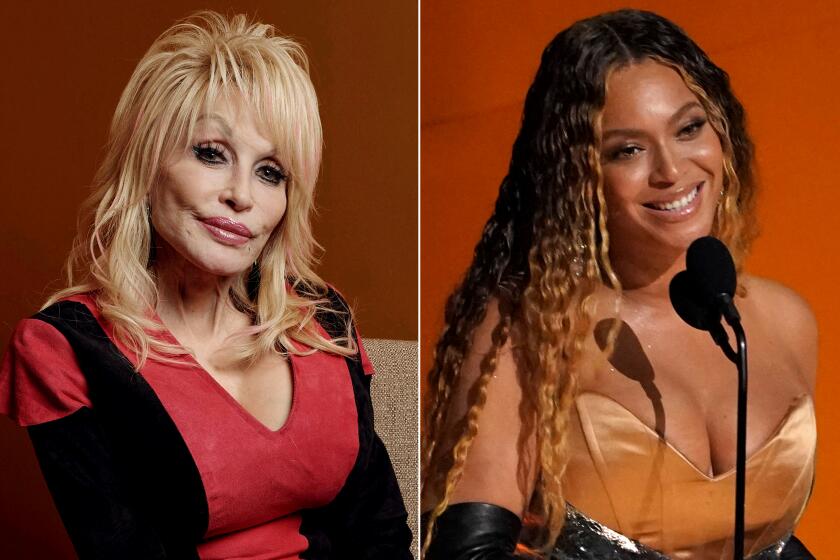Dolly Parton’s ‘Jolene’ is 50: Why her most covered song has enduring global appeal

- Share via
A Congolese singer, a Zimbabwean banjo player and a Mozambican bassist walk into an East Nashville bar. What follows is not a punchline, but the trio’s hypnotic opening salvo on “My Kind of Country,” the 2023 Apple TV series that brings rising stars to Music City from around the globe. These three, known collectively as the Congo Cowboys, have decided to lead with the first track they ever recorded together: “Tonight, we are going to play for you a song called ‘Jolene’ by Dolly Parton,” says vocalist Chris Bakalanga.
Moments into their cover, the men switch from English to Lingala — an inherently musical Central African language — and bring the house down, little aware that Parton recorded the original version 10 minutes away at RCA Studio B. She went on to release the album “Jolene” 50 years ago this month, days after the single of the same name had topped the Billboard Hot Country Songs chart. And after returning to the country charts periodically, “Jolene” has just debuted on Billboard’s Rock Digital Song Sales chart, thanks to Parton’s collaboration with the Italian band Måneskin for the new deluxe version of her “Rockstar” album.
Indeed, having transcended every imaginable stylistic and cultural barrier over the last half-century, the song based loosely on a flirtation between her husband and a brazen bank teller is Parton’s most covered creation. With its mesmeric opening lick, eminently singable chorus and infectious chord progression, “Jolene” has done what few songs ever have: inspired countless homages across eras, languages and oceans, from Brasília to Brazzaville in Congo and Tijuana to Tehran.
A small sampling: The version popularized in pre-revolution Iran by Leila Forouhar, who has long since become a fixture of L.A.’s Persian community; the Finnish cover by Vicky Rosti, whom dedicated Eurovision fans may remember from the ‘80s; and the soundtrack to the 2019 Australian short film “Dolly’s Song” by Kaylene Whiskey, whose acclaimed art often juxtaposes Parton against Indigenous backdrops.
Among the various takes in Spanish — including merengue and mariachi — is the cumbia duet by L.A.’s Chiquis Rivera and Becky G. that appeared on Rivera’s Latin Grammy-winning album “Playlist” (not to mention the L.A. Times’ 10 best Latin Music moments of 2020). The following spring, at the Latin Recording Academy’s first celebration of women’s music on Univisión, Parton surprised viewers by introducing “mi amiga Chiquis” and performing a bilingual version of “Jolene” with the banda star.
Airing on Mother’s Day, the special was particularly poignant for Rivera. Nearly a decade after the death of her own mother — “la Diva de la Banda” Jenni Rivera — “I just felt like my mom had opened up so many doors for me from heaven, and that was one of them,” Chiquis (as everyone calls her) said in a phone interview. “I couldn’t help but to feel her presence that night because I knew what a big fan she was of Dolly’s.”

Fond memories of listening to Parton’s music together had led Chiquis to create the cumbia version in the first place. “One day, I was driving and ‘Jolene’ came on — and it totally took me back,” she said. “I was like, ‘Oh my God, I remember listening to this song with my mom.’ ” Chiquis happened to be recording an album at the time, and her manager thought she should include a cover. He suggested a Spanish version of “Jolene.”
Thinking it would be perfect as a duet, she reached out to her friend Becky G. “She said, ‘Oh my God, I love this song.’ ” Soon, a cumbia juggernaut was born. And so, by the way, was an engagement: Chiquis’ fiancé is the photographer who shot the collaboration. “He’s like, ‘If it wasn’t for Dolly Parton, you and I would have never met,’ ” recounted Chiquis. “So he always says, ‘I love that woman.’ ”
The feeling is nearly universal, no matter how close or distant one’s connection to Parton may be. Perhaps the most startling example? Nelson Mandela, who reportedly piped her music through the PA system of Robben Island while he was incarcerated there.
His fellow freedom fighter and inmate Tokyo Sexwale recounted the story on the 2019 podcast “Dolly Parton’s America.” “He said that at a certain point, the guards allowed Mandela to play music over the loudspeakers for the entire prison,” reported co-host Shima Oliaee. When she asked which songs in particular, Sexwale answered, “He loved ‘Jolene,’ ” adding, “No human being cannot be affected by ‘Jolene.’ ”
Ask musicologists why, and various explanations arise. “You don’t have to be worried that your partner is cheating on you to feel like you’ve got some sort of stake in the song,” said Lydia Hamessley, the Eugene M. Tobin distinguished professor of music at Hamilton College and author of two Parton books: “Unlikely Angel: The Songs of Dolly Parton” and the forthcoming Oxford Keynotes title “Dolly Parton’s Jolene” (due out later this year). Contemplating the meaning of the song, Hamessley posed a question: “Is this always about somebody yearning for a man not to leave, or is it a broader idea of loss?” Many, including Sexwale, favor the latter: “We all don’t want to lose.”
“The other thing I think about is the music itself,” said Hamessley: “It kind of rocks between two different chords that I think people find compelling.” There’s an analogous quality to the theme song of “Gilligan’s Island,” she noted, for anyone interested in a fun little exercise in musical analysis.
Then there are those four successive “Jolenes,” which Parton explained to Oliaee and her co-host Jad Abumrad as — initially — a memory device. One day after “The Porter Wagoner Show,” where Parton performed in the ‘60s and ‘70s, a little girl named Jolene asked for an autograph. “I said, ‘Oh, that’s a beautiful name,’ ” the singer recalled to the hosts. And thinking she might want to use it in a composition someday, she walked back to the tour bus saying, “ ‘Jolene, Jolene, Jolene, Jolene, Jolene, Jolene,’ just so I’d remember the name.” Hearing that repetition, Parton realized she was onto something. Then she thought about the flirty bank teller, renamed her, and wrote a song.

“It’s really powerful the way that line builds up the scale and has an energy that you want to join,” said Hamessley. Another preeminent “Dollyologist” agrees that the exhilaration of singing along is part of the global appeal, no matter how plaintive the words: “There’s a disjunction between the pain of the lyrics when she’s anticipating the heartbreak, and the pleasure in singing the song,” observed Helen Morales, the Argyropoulos professor of Hellenic studies at UC Santa Barbara and author of “Pilgrimage to Dollywood: A Country Music Road Trip Through Tennessee.” “And the focus is not upon the husband — it’s actually on Jolene and the itemization of how beautiful she is, so there’s something sort of campy and fun about the song.” Morales, too, grew up listening to “Jolene” in a context you might not expect: as the child of a Greek Cypriot Dolly Parton fan who raised a family in England.
In fact, the Cape Town-based Congo Cowboys — Chris Bakalanga, originally from the Democratic Republic of Congo, Julio Sigauque, originally from Mozambique, and Simon Attwell, originally from Zimbabwe — also knew the song from childhood. “We’d all grown up with ‘Jolene’ on the radio,” said Attwell in a phone interview. The group’s decision to record the song started with a desire to incorporate banjo — an instrument with African roots — into their sound. Then Attwell saw the White Stripes sing “Jolene” and was so taken with the rendition, it made him think about what the Congo Cowboys could do with the song. A discussion ensued, “and immediately, when Chris started singing in Lingala, it felt good — it felt right,” explained Attwell.
And therein lies the magic: “Jolene” somehow always feels right. In Lingala or Spanish. A cappella or backed by a full string section. In Miley Cyrus’ backyard or the Rock & Roll Hall of Fame. The only place “Jolene” seems conspicuously absent? Parton’s own home. Speaking to the BBC last year, she reported looking at her husband and joking, “‘Every time I see you over there in that La-Z-Boy chair, snorin’ and sleepin’, I think, where is Jolene when you need her? You can have him now, Jolene!’ ”
More to Read
The biggest entertainment stories
Get our big stories about Hollywood, film, television, music, arts, culture and more right in your inbox as soon as they publish.
You may occasionally receive promotional content from the Los Angeles Times.










